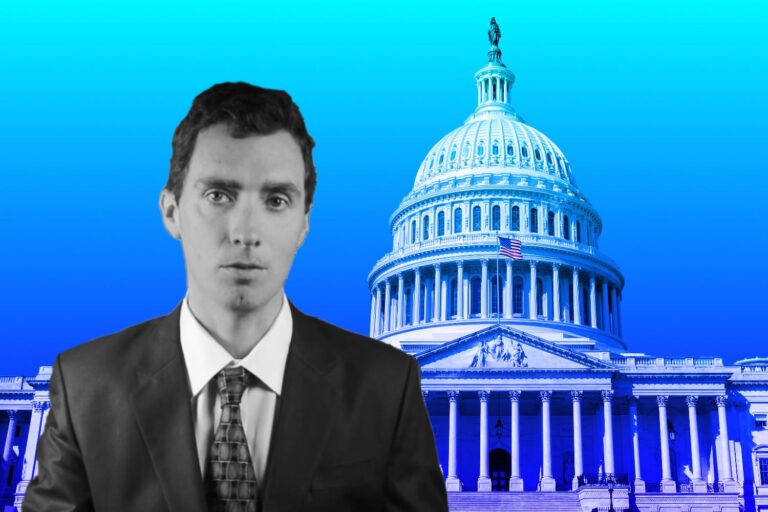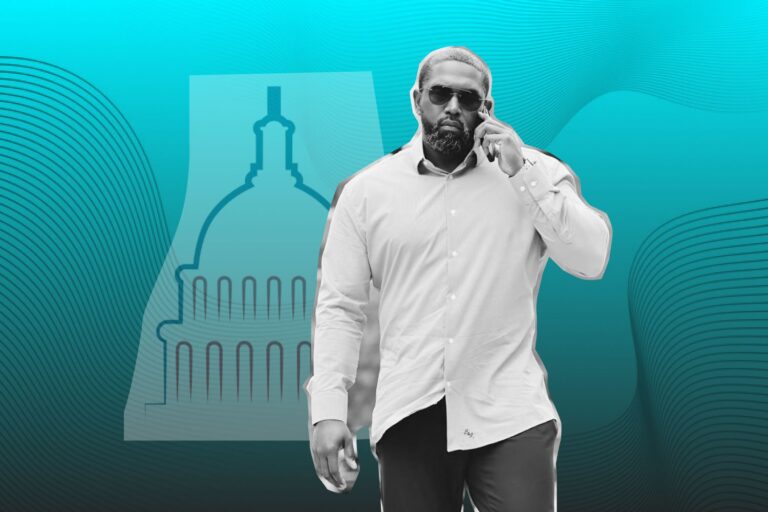Professional Staff Layoffs in The Pandemic: An Unanticipated Reality
Beyond any doubt, millions of people across the country are waking up to fear and uncertainty due to the far-reaching impacts of coronavirus outbreak – particularly ones in the economic sphere. In just the past few days, the COVID-19 pandemic has wiped out almost all the markets, forced school closures, led to major sports leagues to suspend operations, upended the travel industry, and even forced businesses to start trimming out their workforce.
In fact, amongst numerous topics addressed in social conversations as to coronavirus, there exist deep concerns about potential layoffs. Since businesses, especially the service-based SMBs, remain closed, events shut down and a significant portion of advertising is put on pause, several holding companies and agencies have begun implementing layoffs and furloughs, among other cost-cutting measures.
Layoff & Furlough Measures Taken in Response to Coronavirus: Major Examples
Besides restructuring to a work-from-home basis, a large number of struggling businesses are moving to trim workforce amid coronavirus slump in an effort to minimize total operating cost and navigate through this unprecedented time. Let’s take a deeper look over some remarkable ones!
#1. WWE
Despite given clearance resume live shows in Florida, WWE recently announced that it will furlough staff and cut executive pay in an attempt to weather the economic storm brought on by the coronavirus pandemic.
“Given the uncertainty of the situation, the Company also identified headcount reductions and made the decision to furlough a portion of its workforce effective immediately,” the WWE’s statement said. “The decision to furlough versus permanently reduce headcount reflects the fact that the Company currently believes the furlough will be temporary in nature.”

What’s more, the WWE will take other significant steps to save money by cutting talent expenses – such as some of the wrestlers that appear on its programming – or by canceling third-party staffing and consulting arrangements. Also, the entertainment company plans to defer spending on its new headquarters in Stamford, Connecticut, for at least six months.
These cost reductions will save the company roughly $4 million per month, with a cash flow improvement of staggeringly $140 million.
For the time being, the WWE remains the only live sporting event being televised in the U.S., with matches originating from the company’s training facility in Orlando, Florida. By continuing to produce live shows, it can probably keep revenue flowing from its TV rightsholders, even if the decision to hold the matches has been controversial, with the state still under stay-at-home orders.
#2. Opendoor
Opendoor – the seven-year-old San Francisco-based homebuying start-up – has laid off 600 of its employees, which constitutes up to 35% of its overall team, according to a statement by co-founder and CEO Eric Wu. From the Information’s standpoint, these layoffs emerge as “one of the deepest cuts from a private tech firm since the coronavirus outbreak sent the economy into a tailspin.”

Just like so many sectors of the economy, the residential real estate market has taken a hit as U.S. residents are asked to stay indoors and all, but essential services are shut down in most of the country. To be more concise, based on Realtor.com, the number of U.S. homes for sale declined around 15.7% year-over-year in the month of March, with the number of newly listed properties falling by 13.1% the week ending March 21 and by whoppingly 34.0% for the week ending March 28.
And whereas he didn’t go into details with regard to the degree to which Opendoor has been impacted by the COVID-19 shutdown, CEO Eric Wu mentioned that since the outbreak has “had an unforeseen impact on public health, the U.S. economy, and housing,” the company has “seen declines in the number of people buying, selling, and moving during this time of uncertainty.” He also added that the reduction in force is “necessary to ensure that we can continue to deliver on our mission and build the experience consumers deserve.”
Also, in the company statement, Mr. Wu stated that workers affected would receive two months of severance pay and four months of reimbursement for health-care coverage, adding that he and other Opendoor executives would also be donating to an employee relief fund.
#3. Groupon
Another notable case is Groupon, an America global e-commerce marketplace connecting subscribers with local merchants by offering activities, travel, goods, and services. As it grapples to stay afloat amid the coronavirus pandemic, the company said it expects to lay off or furlough 2,800 staff, making up about 44 percent of its total workforce.
The daily deals provider has become the latest business casualty of the outbreak’s economic fallout, just days after US unemployment skyrocketed to its highest peak in 80 years. In a regulatory filing on Monday, Groupon announced such a workforce striking measure after local unit performance dropped by 70 percent in North America in April compared to this time last year.

The layoffs will make up part of a ‘multi-phase’ restructuring plan, with the first phase seeing 1,400 jobs slashed this summer through to July 2021. The second phase of the restructuring will take place by the end of the third quarter, and will include the further 1,400 job cuts, as well as facilities exit costs and non-cash impairment charges.
In fact, the furloughs are a step of its cost-cutting effort that includes a hiring freeze, eliminating merit raises, eliminating cash compensation for non-executive board directors and reducing marketing expenses by significantly shortening payback thresholds and delaying brand marketing investments. Shockingly, this may not be the end of workforce reductions, according to the Chicago-based daily deals site.
For the quarter ended March 31, Groupon projects revenue around $345 million to $385 million, compared with the $578.4 million the company reported in last year’s first quarter.
#4. The Los Angeles Times
A sudden drop in advertising, brought on by the pandemic, is also leading to cost-cutting measures at Patrick Soon-Shiong’s California papers – one of the largest papers in the nation, with a Sunday print circulation over 400,000.
The company that publishes The Los Angeles Times is furloughing 40 employees and cutting the pay of senior managers in an effort to make up for losses as advertising revenue has been “nearly eliminated.”
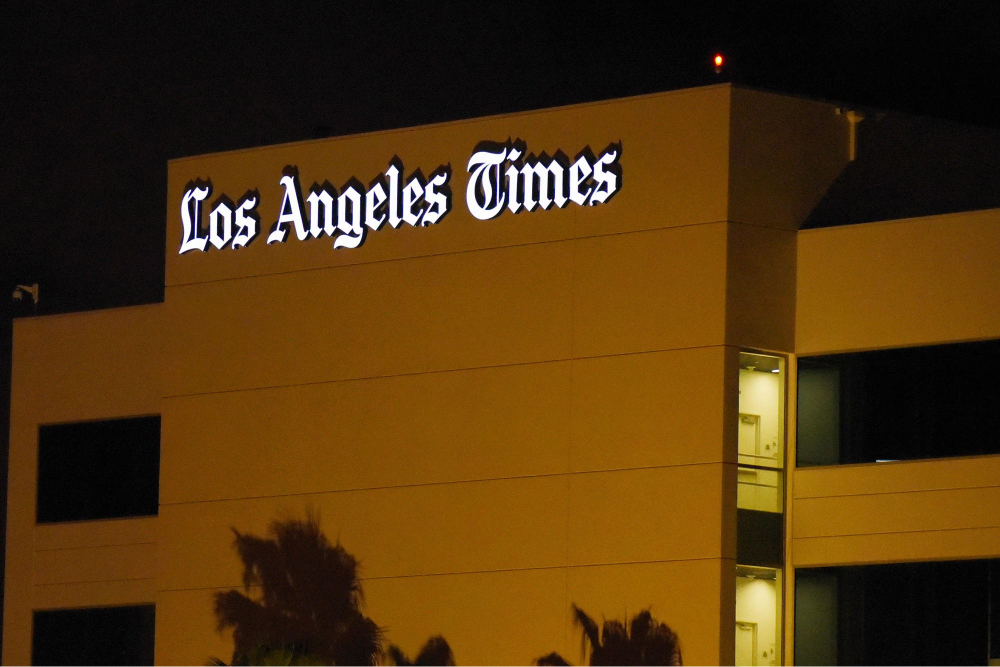
“Due to the unexpected effects of COVID-19, our advertising revenue has nearly been eliminated,” said a memo to the staff on Tuesday from Chris Argentieri, the president of California Times, the publishing company that includes The Times and The San Diego Union-Tribune.
In a separate letter to some staff members, Mr. Argentieri appeared to be more specific, saying, “The Times has lost more than one-third of its advertising revenue and expects to lose more than half of its advertising revenue in the coming months.”
Going into great detail about the Los Angeles Times’s workforce-related measures, the furloughed employees will not work in the Times newsroom – in fact, they could be out as long as 16 weeks and it is possible that they will be laid off at the end of the furlough period. Additionally, as a part of the austerity plan, pay for the senior editorial and business managers at The Times and The Union-Tribune will be reduced by as much as 15 percent for three months, and approximately 401(k) matches will be suspended for non-union workers.
Mr. Argentieri shared that such furloughs as well as other taken measures were necessary for the California Times publications to weather the unexpected steep decline in revenue. “While we’ve made significant progress in growing our digital subscriber base and developing other sources of revenue,” he wrote, “it is not yet enough to offset the losses.”
Amongst other sectors, the advertising landscape sustains one of the heaviest blows. In addition to fore-mentioned big names, let see how some major marketing agencies are doing in response to nation-wide coronavirus outbreak.
#5. Giant Spoon
Up to March 20, the independent agency Giant Spoon has laid off 20 percent of its staff due to the coronavirus pandemic’s negative impact on its experiential business.

The agency behind some of the biggest SXSW activations in recent years, namely “Bleed For the Throne” in 2019 and “SXSWestworld” in 2018, said in a statement that “the COVID-19 pandemic has done serious damage to our experiential business,” which left Giant Spoon no alternatives but to implement the layoffs. In fact, the agency has been “forced to halt production on several 2020 experiential projects.” All of the laid-off employees will receive six months of healthcare coverage, according to the agency.
“We are deeply saddened to have made the decision to reduce our full-time headcount,” an agency spokesperson said in a statement. “Our priority is on those we’re parting with as we adjust our business in real time, our existing clients and teams. The bottom line is the direct and widespread impact caused by the COVID-19 pandemic has done serious damage to our experiential business, which now consists of a core team including leadership, who are working to help clients find digital paths forward. There are no words to soften the pain inflicted on the people most directly affected by this situation.”
#6. Dentsu Aegis Network
Another key player within the advertising scene, Dentsu Aegis Network, confirmed that it has initiated salary reductions and furloughs across the holding company and its individual agencies, which include 360i, mcgarrybowen, Carat, Isobar and iProspect.
According to Adweek, there were also layoffs that hit certain agencies and that the holding company set benchmarks for the measures that varied among the individual shops. When it comes to layoffs, a Dentsu Aegis Network spokesperson declined to comment – yet, as regards the furloughs, the spokesperson said that this measure was carried out “as a means to protect jobs and safeguard livelihoods.”
“Since the coronavirus outbreak, Dentsu Aegis Network’s primary priority has been to protect our people, preserve and nurture our client relationships and to support the local economies and communities in which we operate,” the Dentsu Aegis Network spokesperson shared. “As a result of COVID-19 business impacts, we are activating a set of cost-saving measures across the company to ensure business continuity and to safeguard our people’s livelihoods around the world. We consider our people to be our greatest strength and are doing everything we can to ensure we have a healthy and sustainable business for them and our clients after this crisis passes.”

And according to Ad Age’s information sources, these furloughs were planned to put in place for more or less one quarter.
#7. Omnicom Group
Like other companies within the industry, Omnicom conducted rounds of layoffs across its agencies just days after its Chairman-CEO John Wren warned that furloughs and layoffs were imminent across the group. Strikingly, BBDO Worldwide laid off two of its top executives, New York Chief Creative Officer Greg Hahn and Executive VP-Director of Integrated Production Dave Rolfe – besides, other Omnicom agencies including TBWA, Zimmerman, and DDB were negatively impacted as well.
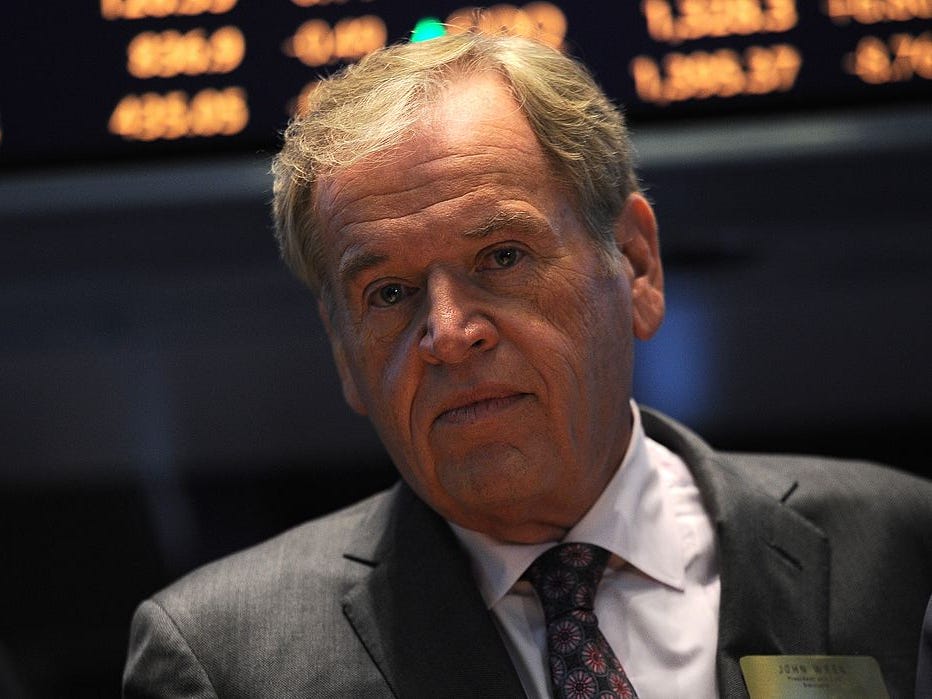
Speaking of such a layoff decision, spokespeople for DDB and Zimmerman declined to comment. BBDO North America Chairman David Lubars also said, “I’m too heartbroken to comment.”
“COVID-19 continues to impact all of us,” a TBWA spokesperson stated. “In the last few weeks, we have had to make adjustments to our workforce due to reduced client spending. The actions we have taken include cutting discretionary costs, salary reductions, shortened workweeks and, as of today, furloughs and staff reductions.”
The spokesperson went on, “Our people are at the heart of our business and that makes these decisions extremely difficult. We are grateful for the contributions of our colleagues who are leaving us this week and will be doing all we can to support them during this transition.”
#8. McCann Worldgroup
On April 16, Mr. Harris Diamond – Chairman-CEO of IPG’s McCann Worldgroup – confirmed that the group has undergone “reductions in staffing” in certain areas of the business.
“The current health crisis is constantly evolving, and creating significant economic impact,” he shared. “As we navigate through this, we are taking a series of steps to ensure we can appropriately support our clients as well as the long-term vitality of the agency. A variety of actions across our agencies are being implemented that include salary cuts, freezes on hiring and temporary labor, major cuts on nonessential spending, and furloughs in markets where that option is available”.

The CEO continued, “Unfortunately, reductions in staffing levels are also taking place in certain areas of the business. These are difficult decisions made in difficult times. Our goal is to serve our clients while protecting as many jobs as we can, and we will, of course, provide as much support as possible.”
Small Businesses & A Sharp Spike in Layoff Figure
As the economy craters, small businesses are undoubtedly among the hardest hit. While many giant names address the financial challenges by implementing layoffs and furloughs, several players within the SMB world just adopt the same measures and even take more significant steps to make themselves through the first shockwave of sheltering in place and stay-at-home orders.
To be more concise, small business layoffs in the United States surged by more than 1,000 percent in March compared to February – with April expected to be even worse as the COVID-19 outbreak grinds economic activity nationwide to a standstill.
According to exclusive data compiled by human resource provider Gusto, based on more than 100,000 small businesses nationwide, the figure for layoffs among small businesses spiked around 1,021% compared to the month before. As a result, Gusto data reveals a 3.7% decline in overall headcount amongst small businesses. Whereas terminations and layoffs had a smaller impact on lost March wages compared to the reduction in hours, the effects of the former are expected to leave broader and longer-term impacts that will significantly affect the earnings of workers in future months.
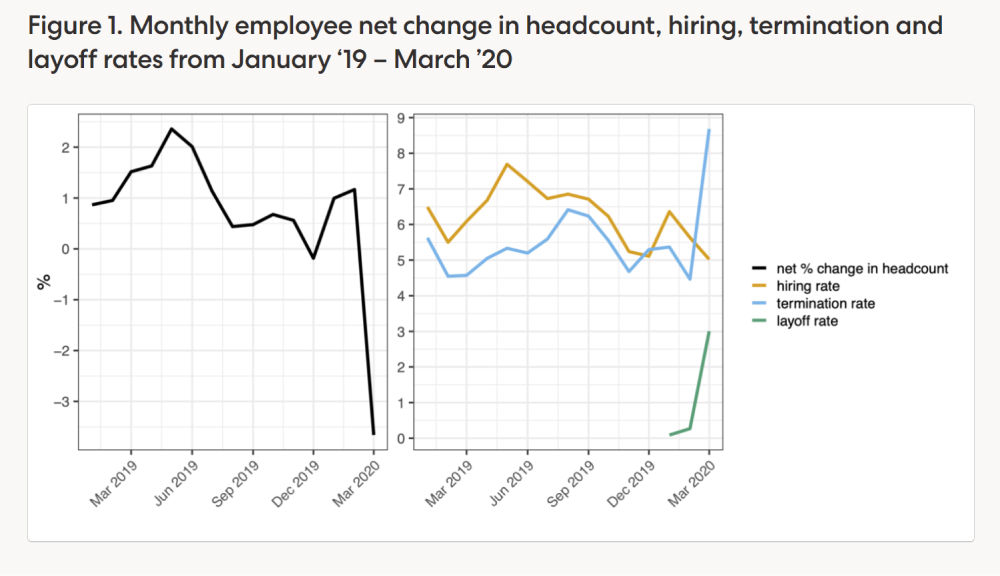
“This is unprecedented,” said Daniel Sternberg, the head of data science at Gusto. “That’s 4% fewer people employed in one month,” – the equivalent of more than 2 million people.
Based on the figure by Small Business Administration, by and large, small businesses employ roughly 59 million people in the U.S – yet, few have much in the way of a financial cushion in case of emergency.
Whilst the coronavirus and its consequential workforce slashing strategies have hit the whole country without leaving any single state, based on Gusto’s survey findings by March ’20, there remain some states with highest reductions in headcount:
| Rank | State | % Change in headcount | Actions taken by state and local governments |
| 1 | New York | -7.50% | Stay-at-home order issued on March 22 |
| 2 | Nebraska | -7.40% | No stay-at-home order. Omaha restaurants and bars required to move to takeout/delivery only as of March 19th |
| 3 | New Mexico | -6.50% | Stay-at-home order issued on March 24 |
| 4 | Alaska | -6.10% | Stay-at-home order issued on March 28 |
| 5 | North Dakota | -5.80% | No stay-at-home order |
| 6 | Pennsylvania | -5.60% | Stay-at-home orders issued for multiple counties in Philadelphia and Pittsburgh metros on March 23. PA statewide order issued on April 1. |
| 7 | Hawaii | -5.60% | Stay-at-home order issued on March 24 |
| 8 | Oregon | -5.30% | Stay-at-home order issued on March 23 |
| 9 | New Jersey | -5.30% | Stay-at-home order issued on March 24 |
| 10 | District of Columbia | -5.20% | Non-essential businesses closed on March 24. Stay-at-home order issued March 30. |
Small Business Dilemma & Proposed Dilemma Solver
1. Entrepreneurial Dilemma: Cutting Costs by Staff Layoffs Vs Keeping Brand Consistency
As already discussed, there is a myriad of small businesses undergoing professional staff layoffs to stay afloat amid the pandemic – amongst the laid-off ones are a significant portion of marketing employees. Whereas there is no exact number of marketer getting laid off, a survey by over 17,000 verified professionals on the Fishbowl app highlighted that advertising professionals expressed the most fear about company layoffs, with staggeringly 65.4% answering with ‘Yes’ when asked “Do you believe the coronavirus will result in layoffs at your company?”
Reducing marketing-related headcount seems to be an inevitable decision when it comes to minimizing the overall operating cost – yet, such an action poses a serious threat of negatively impacting the branding activities.
Since your target customers are on self-quarantine and avoiding public places, the only way to stay connected to them is to promote online marketing campaigns to trigger interest and engagement. And unless you wish to “distance yourself” socially from your customers as well as stay behind your competitors, it’s a “must” that you map out a well-thought-and-well-executed online marketing plan and adopt some handy advertising tactics.
Nevertheless, taking charge of the marketing burden while managing other tons of operating tasks – in a state of headcount reduction – turns out to be an overwhelming responsibility, if not impossible, for small business owners and executives. This concern represents a serious entrepreneurial dilemma, which every single SMB should take into close consideration
2. Dilemma Solver: Online Presence Manager as A Service
Amongst a few viable solutions you may come up with, “partnering” with an online presence manager should turn out to be a smart choice. The flexible solution of a dedicated online presence manager is going to address your concerns – to help your SMB keep consistent operation and brand awareness with access to the specialist expertise you require while still holding full control of your marketing roadmap amid the epidemic.

Savings on Salaries, Time & Training
For every single business struggling through such a troubled time, controlling expenditure can mean the difference between success and failure. Cost control and proper expense management is more than essential for ensuring liquidity, employee accountability, more accurate financial records, and better budgeting.
And fortunately, adopting an external marketing service can ease such “expense” headaches. In fact, no matter how negligible it seems to be, avoiding “hidden costs” or saving times when performing your online branding activities does wonder for your small business.
It’s also noteworthy that the pricing dynamic within a large number of marketing firms has shifted: They are now working on clearly spelled out pricing structures, and lower-fee marketing retainer agreements. Now, let’s take a look at the below table to figure out the cost structure of this flexible MaaS plan:
| Enrolling in a flexible MaaS plan for a typical $1M-revenue business | |
| Smart Plan Agreement 1 Year | |
| Monthly MaaS Subscription | $399 |
| 20% discount hourly rate – Monthly custom work beyond the scope, approximately based on needs. | $1,000 |
| Total Annual Expenditure | $16,788 |
Specialist Knowledge & Experience
It is almost impossible that one person – one particular SMB owner, marketing manager or senior executive – knows everything. This explains why hiring external resources from well-established agencies makes good business sense – in fact, if smartly choosing, you’re explicitly purchasing the services of experts.
Understandably, an agency will usually be an expert in their field – they do “boast” more collective knowledge than any business owner or manager – and also obtain access to in-house expertise on the finer details.
To take an example, in EnvZone, we do offer an Online Presence Manager as a Service. An Ongoing Presence Management Plan includes graphic designers, writers, web developers, strategists, marketing consultants and social media pros – which is often more efficient and cost-effective than hiring a full team in-house. More than that, there is an on-demand dedicated team who obtains the expertise to help you navigate even the most frustrating of shortcomings.
Not only do we have knowledge and experience in marketing, but we’ve also obtained the marketing experience in various fields ranging from e-commerce, healthcare to hospitality and travel. As a result, we can meet you half-way, even in this crisis time brought out by coronavirus!
Additional Benefits…
Apart from these two, there are other attractive benefits of partnering with an on-demand online presence manager that’s well worth your attention:
- Experience in executing marketing plans, especially online ones.
- Money savings by hiring to your specific needs
- Expertise with your market niche
- Your marketing plan is executed immediately, the employee may need time to ramp up while the marketing firm is ready from the get-go
- Avoid the concerns over headcount reduction as well as other HR nightmares
- No additional overhead
- Tax deductions, not tax liability
- Efficiency, especially for short term and urgent projects
As a business owner, this new paradigm will allow you to focus on running your business’s core operations as well as increasing the bottom line, rather than struggling to build out a website or messing around with Google, Facebook or Twitter.
The Bottom Lines
The COVID-19 outbreak has been wreaking havoc worldwide, and businesses of all sizes should start off preparing for the impact. Some hardest decisions are forced to be taken, particularly the one to implement layoff and furlough measuresin an attempt to cut cost and weather the economic storm.
Navigating your SMB through this unprecedented time is already overwhelmed with several operational activities but keeping your business image visible online is also crucial to ignite the profitability of your business. Should you need any help with a dedicated team to get your business exposed to the digital world, don’t hesitate to get an Online Presence Manager.


